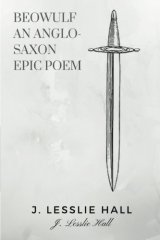Beowulf Page #15
Beowulf is an Old English epic poem consisting of 3,182 alliterative lines. It is one of the most important works of Old English literature. The date of composition is a matter of contention among scholars; the only certain dating pertains to the manuscript, which was produced between 975 and 1025.
XVII. BANQUET (continued).--THE SCOP'S SONG OF FINN AND HNÆF. {Each of Beowulf's companions receives a costly gift.} And the atheling of earlmen to each of the heroes Who the ways of the waters went with Beowulf, A costly gift-token gave on the mead-bench, Offered an heirloom, and ordered that that man {The warrior killed by Grendel is to be paid for in gold.} 5 With gold should be paid for, whom Grendel had erstwhile Wickedly slaughtered, as he more of them had done Had far-seeing God and the mood of the hero The fate not averted: the Father then governed All of the earth-dwellers, as He ever is doing; 10 Hence insight for all men is everywhere fittest, Forethought of spirit! much he shall suffer Of lief and of loathsome who long in this present Useth the world in this woful existence. There was music and merriment mingling together {Hrothgar's scop recalls events in the reign of his lord's father.} 15 Touching Healfdene's leader; the joy-wood was fingered, Measures recited, when the singer of Hrothgar On mead-bench should mention the merry hall-joyance Of the kinsmen of Finn, when onset surprised them: {Hnæf, the Danish general, is treacherously attacked while staying at Finn's castle.} "The Half-Danish hero, Hnæf of the Scyldings, 20 On the field of the Frisians was fated to perish. Sure Hildeburg needed not mention approving The faith of the Jutemen: though blameless entirely, {Queen Hildeburg is not only wife of Finn, but a kinswoman of the murdered Hnæf.} When shields were shivered she was shorn of her darlings, Of bairns and brothers: they bent to their fate 25 With war-spear wounded; woe was that woman. Not causeless lamented the daughter of Hoce The decree of the Wielder when morning-light came and She was able 'neath heaven to behold the destruction [38] Of brothers and bairns, where the brightest of earth-joys {Finn's force is almost exterminated.} 30 She had hitherto had: all the henchmen of Finn War had offtaken, save a handful remaining, That he nowise was able to offer resistance[1] {Hengest succeeds Hnæf as Danish general.} To the onset of Hengest in the parley of battle, Nor the wretched remnant to rescue in war from 35 The earl of the atheling; but they offered conditions, {Compact between the Frisians and the Danes.} Another great building to fully make ready, A hall and a high-seat, that half they might rule with The sons of the Jutemen, and that Folcwalda's son would Day after day the Danemen honor 40 When gifts were giving, and grant of his ring-store To Hengest's earl-troop ever so freely, Of his gold-plated jewels, as he encouraged the Frisians {Equality of gifts agreed on.} On the bench of the beer-hall. On both sides they swore then A fast-binding compact; Finn unto Hengest 45 With no thought of revoking vowed then most solemnly The woe-begone remnant well to take charge of, His Witan advising; the agreement should no one By words or works weaken and shatter, By artifice ever injure its value, 50 Though reaved of their ruler their ring-giver's slayer They followed as vassals, Fate so requiring: {No one shall refer to old grudges.} Then if one of the Frisians the quarrel should speak of In tones that were taunting, terrible edges Should cut in requital. Accomplished the oath was, 55 And treasure of gold from the hoard was uplifted. {Danish warriors are burned on a funeral-pyre.} The best of the Scylding braves was then fully Prepared for the pile; at the pyre was seen clearly The blood-gory burnie, the boar with his gilding, The iron-hard swine, athelings many 60 Fatally wounded; no few had been slaughtered. Hildeburg bade then, at the burning of Hnæf, [39] {Queen Hildeburg has her son burnt along with Hnæf.} The bairn of her bosom to bear to the fire, That his body be burned and borne to the pyre. The woe-stricken woman wept on his shoulder,[2] 65 In measures lamented; upmounted the hero.[3] The greatest of dead-fires curled to the welkin, On the hill's-front crackled; heads were a-melting, Wound-doors bursting, while the blood was a-coursing From body-bite fierce. The fire devoured them, 70 Greediest of spirits, whom war had offcarried From both of the peoples; their bravest were fallen. [1] For 1084, R. suggests 'wiht Hengeste wið gefeohtan.'--K. suggests 'wið Hengeste wiht gefeohtan.' Neither emendation would make any essential change in the translation. [2] The separation of adjective and noun by a phrase (cf. v. 1118) being very unusual, some scholars have put 'earme on eaxle' with the foregoing lines, inserting a semicolon after 'eaxle.' In this case 'on eaxe' (i.e., on the ashes, cinders) is sometimes read, and this affords a parallel to 'on bæl.' Let us hope that a satisfactory rendering shall yet be reached without resorting to any tampering with the text, such as Lichtenheld proposed: 'earme ides on eaxle gnornode.' [3] For 'gúð-rinc,' 'gúð-réc,' battle-smoke, has been suggested. XVIII. THE FINN EPISODE (continued).--THE BANQUET CONTINUES. {The survivors go to Friesland, the home of Finn.} "Then the warriors departed to go to their dwellings, Reaved of their friends, Friesland to visit, Their homes and high-city. Hengest continued {Hengest remains there all winter, unable to get away.} Biding with Finn the blood-tainted winter, 5 Wholly unsundered;[1] of fatherland thought he Though unable to drive the ring-stemmèd vessel [40] O'er the ways of the waters; the wave-deeps were tossing, Fought with the wind; winter in ice-bonds Closed up the currents, till there came to the dwelling 10 A year in its course, as yet it revolveth, If season propitious one alway regardeth, World-cheering weathers. Then winter was gone, Earth's bosom was lovely; the exile would get him, {He devises schemes of vengeance.} The guest from the palace; on grewsomest vengeance 15 He brooded more eager than on oversea journeys, Whe'r onset-of-anger he were able to 'complish, The bairns of the Jutemen therein to remember. Nowise refused he the duties of liegeman When Hun of the Frisians the battle-sword Láfing, 20 Fairest of falchions, friendly did give him: Its edges were famous in folk-talk of Jutland. And savage sword-fury seized in its clutches Bold-mooded Finn where he bode in his palace, {Guthlaf and Oslaf revenge Hnæf's slaughter.} When the grewsome grapple Guthlaf and Oslaf 25 Had mournfully mentioned, the mere-journey over, For sorrows half-blamed him; the flickering spirit Could not bide in his bosom. Then the building was covered[2] {Finn is slain.} With corpses of foemen, and Finn too was slaughtered, The king with his comrades, and the queen made a prisoner. {The jewels of Finn, and his queen are carried away by the Danes.} 30 The troops of the Scyldings bore to their vessels All that the land-king had in his palace, Such trinkets and treasures they took as, on searching, At Finn's they could find. They ferried to Daneland The excellent woman on oversea journey,
Translation
Translate and read this book in other languages:
Select another language:
- - Select -
- 简体中文 (Chinese - Simplified)
- 繁體中文 (Chinese - Traditional)
- Español (Spanish)
- Esperanto (Esperanto)
- 日本語 (Japanese)
- Português (Portuguese)
- Deutsch (German)
- العربية (Arabic)
- Français (French)
- Русский (Russian)
- ಕನ್ನಡ (Kannada)
- 한국어 (Korean)
- עברית (Hebrew)
- Gaeilge (Irish)
- Українська (Ukrainian)
- اردو (Urdu)
- Magyar (Hungarian)
- मानक हिन्दी (Hindi)
- Indonesia (Indonesian)
- Italiano (Italian)
- தமிழ் (Tamil)
- Türkçe (Turkish)
- తెలుగు (Telugu)
- ภาษาไทย (Thai)
- Tiếng Việt (Vietnamese)
- Čeština (Czech)
- Polski (Polish)
- Bahasa Indonesia (Indonesian)
- Românește (Romanian)
- Nederlands (Dutch)
- Ελληνικά (Greek)
- Latinum (Latin)
- Svenska (Swedish)
- Dansk (Danish)
- Suomi (Finnish)
- فارسی (Persian)
- ייִדיש (Yiddish)
- հայերեն (Armenian)
- Norsk (Norwegian)
- English (English)
Citation
Use the citation below to add this book to your bibliography:
Style:MLAChicagoAPA
"Beowulf Books." Literature.com. STANDS4 LLC, 2025. Web. 10 Mar. 2025. <https://www.literature.com/book/beowulf_945>.








Discuss this Beowulf book with the community:
Report Comment
We're doing our best to make sure our content is useful, accurate and safe.
If by any chance you spot an inappropriate comment while navigating through our website please use this form to let us know, and we'll take care of it shortly.
Attachment
You need to be logged in to favorite.
Log In